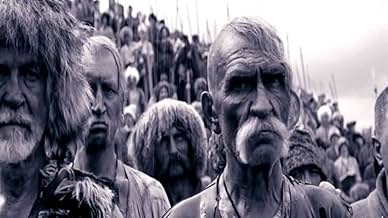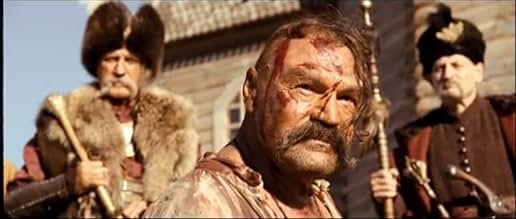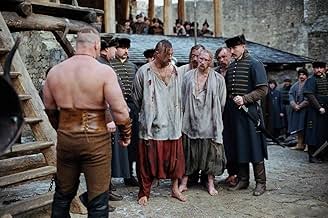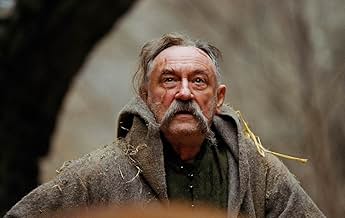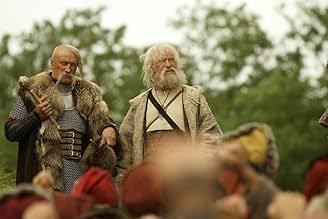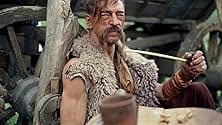IMDb-BEWERTUNG
5,7/10
3494
IHRE BEWERTUNG
Füge eine Handlung in deiner Sprache hinzuSet in the 16th century, this is a story about Ukraine's Cossack warriors and their campaign to defend their lands from the advancing Polish armies.Set in the 16th century, this is a story about Ukraine's Cossack warriors and their campaign to defend their lands from the advancing Polish armies.Set in the 16th century, this is a story about Ukraine's Cossack warriors and their campaign to defend their lands from the advancing Polish armies.
- Auszeichnungen
- 5 Gewinne & 3 Nominierungen insgesamt
Yury Belyayev
- Koshevoy Kirdaga
- (as Yuriy Belyaev)
Sergey Bezrukov
- Narrator
- (Synchronisation)
Sergey Dreyden
- Yankel - the Jew
- (as Sergey Dontsov)
Alim Kouliev
- Cossack Moisei Shilo
- (English version)
- (Synchronisation)
Liubomiras Laucevicius
- Polish Duke
- (as Liubomiras Lauciavicius)
Handlung
WUSSTEST DU SCHON:
- Wissenswertes150 horses were used in the film.
- PatzerOn two occasions, it is raining in spite of the day clearly being sunny.
- Alternative Versionen"Veer" (2010)
- VerbindungenRemake of Taras Bulba (1936)
Ausgewählte Rezension
Bortko set out to make an apparent epic here, but sadly, missed an opportunity to tell a great story. I researched Gogol before watching this film; the essence of the story is covered in the film's plot. What Gogol did NOT include was the Russian polemic which slaps you in the face at every turn in this film.
I agree with some of the other reviewers that casting and costuming were great! Fabulous actors, wonderful faces, but a sodden, leaden, boring script deprived them of a chance to display their true talent. Bogdan Stupka is always a pleasure to watch, and for a better version of these times, watch Hoffman's 1999 Polish epic "Ogniem i mieczem", in which Stupka plays Bogdan Khmelnitski.
The patriotic speeches, both in the sich and during the battle death scenes, slowed the movie to a dead crawl (no pun intended!) and greatly detracted from the film's impact. As others have noted, this is truly a Ukrainian story, not a Russian one. Ukraine was mentioned only twice in the movie (I counted). Endless speeches (particularly with a slit stomach) about the sacred Russian soil really have no place in a story about Polish/Ukrainian struggles, and only serve to underscore that the film's budget was heavily subsidized by the Russian government. At a time when the East and West need to work together to solve this world's problems, western xenophobia seems highly counterproductive. Such films only widen the divide and hurt us all as creatures of this planet.
One note about the score: nice idea again, but endlessly repetitious. I recognized in the main theme a variation of a famous Ukrainian carol "Novo radist stala", which I have sung many times, but it was extremely overdone. A little variation would have been nice. The repetitive score reminded me of another score for Bortko's "The Idiot", a wonderful Russian serial based on the Dostoevsky novel (2003). More endless repetition of the musical theme was the one negative in an otherwise flawless ensemble of actors and a compelling story.
In summary, this film was watchable but mostly boring. Some of the horrendously violent scenes made me cross myself. Not a total waste of two hours; however, it left me feeling that it could have been so much better with a little more effort and less propaganda.
I agree with some of the other reviewers that casting and costuming were great! Fabulous actors, wonderful faces, but a sodden, leaden, boring script deprived them of a chance to display their true talent. Bogdan Stupka is always a pleasure to watch, and for a better version of these times, watch Hoffman's 1999 Polish epic "Ogniem i mieczem", in which Stupka plays Bogdan Khmelnitski.
The patriotic speeches, both in the sich and during the battle death scenes, slowed the movie to a dead crawl (no pun intended!) and greatly detracted from the film's impact. As others have noted, this is truly a Ukrainian story, not a Russian one. Ukraine was mentioned only twice in the movie (I counted). Endless speeches (particularly with a slit stomach) about the sacred Russian soil really have no place in a story about Polish/Ukrainian struggles, and only serve to underscore that the film's budget was heavily subsidized by the Russian government. At a time when the East and West need to work together to solve this world's problems, western xenophobia seems highly counterproductive. Such films only widen the divide and hurt us all as creatures of this planet.
One note about the score: nice idea again, but endlessly repetitious. I recognized in the main theme a variation of a famous Ukrainian carol "Novo radist stala", which I have sung many times, but it was extremely overdone. A little variation would have been nice. The repetitive score reminded me of another score for Bortko's "The Idiot", a wonderful Russian serial based on the Dostoevsky novel (2003). More endless repetition of the musical theme was the one negative in an otherwise flawless ensemble of actors and a compelling story.
In summary, this film was watchable but mostly boring. Some of the horrendously violent scenes made me cross myself. Not a total waste of two hours; however, it left me feeling that it could have been so much better with a little more effort and less propaganda.
Top-Auswahl
Melde dich zum Bewerten an und greife auf die Watchlist für personalisierte Empfehlungen zu.
- How long is Taras Bulba?Powered by Alexa
Details
- Erscheinungsdatum
- Herkunftsland
- Offizielle Standorte
- Sprachen
- Auch bekannt als
- Taras Bulba
- Drehorte
- Produktionsfirma
- Weitere beteiligte Unternehmen bei IMDbPro anzeigen
Box Office
- Budget
- 15.700.000 $ (geschätzt)
- Weltweiter Bruttoertrag
- 18.888.220 $
- Laufzeit2 Stunden 11 Minuten
- Farbe
Zu dieser Seite beitragen
Bearbeitung vorschlagen oder fehlenden Inhalt hinzufügen

Oberste Lücke
By what name was Steppensturm - Der Aufstand der Kosaken (2009) officially released in Canada in English?
Antwort

